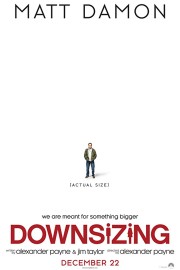Downsizing
When I think of Alexander Payne, I think of a certain type of film. Acerbic humor, smart but funny characterizations and honest storytelling. This has been a through-line in his work starting with “Citizen Ruth,” and continuing through “Election,” “About Schmidt,” “Sideways,” “The Descendants” and “Nebraska.” In the first half of his latest film, “Downsizing” (co-written with frequent collaborator Jim Taylor), you think that this might be the case once again, with a little bit of the socio-political satire of “Citizen Ruth” and “Election” returning to Payne’s work, but you get the sense, relatively quickly, that Payne isn’t quite sure of what kind of story he wants to tell here, and even after the arrival of the film’s best asset, “Downsizing” remains lost in the type of film it wants to be. It’s easily the least satisfying film of Payne’s recent career (I can’t speak for his pre-“Ruth” work), and you wonder where he might go from here.
Matt Damon stars as Paul Safranek, an average man who works as an occupational therapist at a steak plant in Omaha and is married to Audrey (Kristen Wiig). They live in the same house that Paul grew up, where his mother stayed until she died, and their lives are not what they wanted them to be, especially with debt piling up. They head to their high school reunion, and there they run into Dave Johnson (Jason Sudeikis) and his wife, who found an amazing way to stretch their money further. I should back up, though, because “Downsizing” really starts with a researcher in Norway (Rolf Lassgård), who finds a way to shrink human beings to 5cm tall. He is part of a group exploring ways to combat overpopulation and other manner of saving humanity on Earth, and this radical idea seems to become a key to doing so. The less space humanity takes up on Earth, the less of a carbon footprint, right? And the housing communities that have built up in just a decade for those who wish to “downsize,” as it’s called, promise that your dollar in the full-size world will stretch to where you wouldn’t have to work again. Paul and Audrey go all-in on the life-change, but if you’ve seen the previews, you know that Audrey gets cold feet, leaving Paul alone on his journey to miniature size.
If you think solely about the hook I’ve set up with regards to Matt Damon’s character, you can see the bones of a really interesting, high-concept Alexander Payne character piece about how Paul puts his life together after getting shrunk, and having Audrey back out at the last minute. And the movie is still kind of like that, but about half-way into the movie, there’s an introduction of a character into Paul’s life that throws the focus of the story completely out of whack. The character is Ngoc Lan Tran, a Vietnamese dissident played by Hong Chau, and she is both the best thing about the movie, and the reason it flies off the rails, thematically. Ngoc Lan Tran’s backstory is given in a brief TV news story Paul is watching after he gets downsized, where she is an activist against the government of Vietnam, who uses the downsizing technology to shrink her and others as punishment. She escapes in a TV box with others, and is the only one who survives the journey, and, when she arrives in America, she is taken to Leisureland (the community Paul lives in) for treatment and rehabilitation. When we meet her, she is a maid who comes in to clean Paul’s neighbor Dusan’s apartment after a party; Dusan is played by Christoph Waltz, and it is interesting to see him play something other than a villain, but it’s still the same kind of character we expect from him. Paul is taken by her and inspired by her, and they hang out, and we start to see a different view of the downsized world than that which has been given to us, at that point. Throughout the film, Payne and Taylor have laid out some of the moral and ethical questions of the downsizing process, and it points to a broader social commentary that sci-fi can sometimes present its audience, but there’s no focus here. While downsizing has been touted as a way for humanity to help Earth and our effects on it, other questions such as the rights of downsized people- whose increased buying power takes away from the economy, who don’t really pay their share of taxes- or government abuse of the process or the impact on immigration or terrorism are brought up, but never really given the same respect, which is baffling considering how central to the story Chau, who gives a great, heartfelt performance, becomes. She opens up the world to Paul in a way Paul didn’t quite realize he was missing, and the bond the two end up sharing is central to the film. Damon is ok in the movie, but it’s his scenes with Chau where he really is given something interesting to play off of, and together, they give “Downsizing” the heart that it’s otherwise missing. She makes the movie, but she also illuminates why it doesn’t work. That’s all the more reason to see her performance, even if you end up not liking the film.










